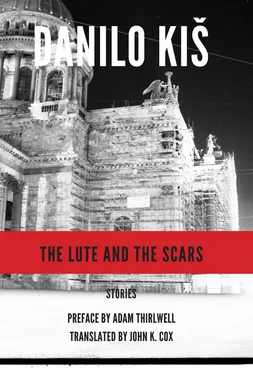It was early autumn and warm out, and people were still seated in the garden. An undertone of voices was audible, along with clinking silverware and tittering women. Upon entering I took a look at the guests and discovered with astonishment that in the two years of my absence nothing had changed; they were all sitting in their old places and appeared to be drinking the same bottles of wine that they had ordered on the last evening I was here. It was just that the women were a touch more voluptuous, and the men, graying at the temples, had let their bellies go. The rings under everyone’s eyes were even darker, and their voices had become more gravelly still from drink and tobacco. With my back turned to the garden there was now only one table in my field of vision, the one under the gnarled tree, closest to the entrance. Two middle-aged men I did not know were sitting at the table, along with a round-faced woman with bleached-blonde hair and small, lively eyes. The woman kept giving me a little smile.
“Don’t you recognize me?”
I shook my head.
“Anjutka,” she said. “We met once at Nikola’s house.”
Now I remembered.
“Don’t burn your bridges behind you,” I repeated under my breath. “How are you?”
“I got married,” she said. “This is my husband.”
She looked like a shaggy old dog. She was constantly brushing the hair out of her eyes; she tossed her head back coquettishly, causing the flabby skin on her cheeks to shake. She was one of those women who don’t understand how to grow old, who add to the misfortune of aging a grotesque mask of youthfulness. It was easy for me to calculate how old she was. Back when I slept with her, she had been thirty-nine; I had been twenty-three then; and since that time about fifteen years had passed. “I could have been your mother,” she told me. “Almost.” In those days I lived in the vicinity of the Dunav railway station. She demanded that I retain the formal mode of address. “ This doesn’t give you the right to speak casually to me,” she said; then she would go back to rolling her eyes and imitating the throes of passion. In the morning I walked her to the streetcar stop and told her we wouldn’t be seeing each other again. She answered me with a proverb: “Don’t burn your bridges behind you.” She was right. A week later I looked her up again. “I’ve been thinking of you, Anjutka.” In the morning I awoke on her maternal bosom.
In those days she worked as a guide for Russian tourists and traded on the black market. She succeeded in selling me Bulgarian rose water (tiny ampoules in a wooden container that resembled a salt cellar), a portrait of Pushkin in bronze bas-relief on a pedestal of Caspian marble, and Blok’s selected works in three volumes (Moscow, 1958). I knew that these were gifts she had received from Russian tourists.
She leaned across the table toward the other men and related something to them in a low voice while shaking her head. I observed the fatal workings of time on her face.
I had the waiter take her a bottle of wine, and after I’d eaten my soup I started to leave. It was going on three in the morning. When I tried to get past her, she grabbed my sleeve.
“You weren’t at Nikola’s funeral,” she said. “You must have been abroad again.”
“Yes, I was.”
“There were only four of us there to walk the coffin to his grave-side. He died in his sleep. They found him a week later. I don’t believe he suffered. Here’s my card. Call me sometime.”
I was listening to her voice as if from a distance. I remember shaking hands with both men, one of whom was her husband. Then I went down Francuska Street toward the Republic Square and then on towards the Hotel Moskva. The shop windows in the passage of the Zvezda cinema were still lit up; dust had gotten into the fabric on the buttons for sale, changing their colors; dead flies covered the glass bottoms of the display cases as if they were dried-out aquariums. The pre-dawn sky was purple with the far-off harbingers of sunrise. When I was in the passage , I heard the jangling of an alarm clock; in a window facing the courtyard a light went on.
The courtyard entrance was barricaded with rotten planks; there were rows of rusty trashcans in front of it. A cat leapt out from between them and raced right past me. I peered through the decayed boards; inside it was dark and reeked of urine. I thought I could hear the squeaking of rats. I walked back out to the road. At the corner I started down Balkanska Street. Through a metal fence I saw a warehouse in the first light of day. The wall separating it from the house in which I’d once lived had been torn down, and the windows of the house had been removed and the roof demolished. In the shed stood a truck loaded with bricks and crushed rock next to enormous rolls of cable. I suddenly became aware of birds twittering, and I looked in their direction. A large sumac tree leaned over the courtyard, its foliage still green and swaying, as though anticipating the imminent sunrise and not simply buffeted by the breeze. I remembered: people can cut sumac back, but a new shoot will always poke up somewhere else. It can penetrate stone or concrete.
During my final years as a student I had found a room in the center of the city — the dream of all students, especially those from the provinces. That gave you not only a certain amount of social prestige but also the advantage of staying late in the cafés without the fear of missing the last bus and then having to wait till early the next morning — chilled to the bone in the wintertime (an experience familiar to all of us). The apartment was located in a passage and had entrances from two different streets. If you went through the passage— with its display windows for leather-goods stores, for stores that would mend nylon stockings, sell fountain pens and buttons, do alterations — you came out in a courtyard of little paving stones. At the far end, on the left, was a recessed doorway that led down to the lower level of the building, facing Balkanska Street, via a set of steps made of worn brick. The building was old and had just two floors. There were Turkish balconies and walls from which the plaster was crumbling, warped window frames, and a shaky wooden door. My landlords were elderly Russians, emigrants who’d come during the 1920s, a married couple without children. They rented out my room for a sum that covered a part of the electric and water bills; one could say they let it out more or less gratis . I had been sent their way by a certain Anjutka, a tour guide. I had met her on Skadarlija Street, thanks to some Russian writers whom she was supposed to hand over to me so I could take them to an official dinner in the Writers’ Club.
I slept on an iron army cot, while the other bed, on the wall opposite, was occupied by Nikola, one of my landlords. Marija Nikolajevna, his wife, slept in the smaller second room, which also served as the kitchen.
Because I was often out of the house — by day in the library, in the evenings at the club — I was satisfied with my new lodgings; they worked fine as a free place to lay my head, and one that was in the city center to boot; I had access to a bathroom with hot water, and my landlords didn’t hold it against me when I came home late.
Marija Nikolajevna was a sickly, somewhat sarcastic woman with a puffy face that was disfigured on one side by traces of burns. Her hands showed the damage too; scalded, contracted skin was drawn taut over muscles and tendons; her fingers resembled claws. Marija Nikolajevna seldom set foot in the “men’s quarters.” She would knock on the door, stick her head into the room, and let fly some incontrovertible observation: “I know you don’t own anything except this guitar. You don’t have to lie.” Or: “Somebody threw up last night in the bathroom. I hope it wasn’t Nikola. Next time it needs to be cleaned up better. Good night.” Or: “Yesterday, the bathroom was completely filled with smoke. You weren’t even home. This means Nikola has started smoking. It’s all due to your bad influence.” (In a very stern voice:) “He’s also taken to drinking with you. He never used to drink before. With you around he’s become a bohemian too.”
Читать дальше












